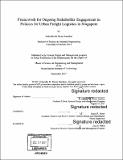Framework for ongoing stakeholder engagement in policies for urban freight logistics in Singapore
Author(s)
Ricart Surribas, Gabriella M
DownloadFull printable version (22.24Mb)
Other Contributors
System Design and Management Program.
Advisor
Bryan R. Moser.
Terms of use
Metadata
Show full item recordAbstract
While research in the urban freight field has mainly focused on evaluating regulation, stakeholder preferences prior or after a policy has been implemented, or on a single type or sub-set of agents and freight policies, the core of this thesis centers on differentiating aspects of urban freight policy design. This thesis aims to uncover how a systematic evaluation of urban freight policy design for retail malls in Singapore could weave stakeholder engagement into the policy lifecycle. This work also provides a framework for assessing the impact that a wide range of urban freight solutions could have on the different system stakeholders. System design tools, including Stakeholder Value Network (SVN) analysis and tradespace exploration, were leveraged to (1) identify key architectural aspects of urban freight policy design and (2) generate multi-dimensional policy configurations. Insight from a survey administered to retail shop owners in two large malls in Singapore as well as findings from other research on stakeholder preferences and perceptions of urban freight solutions were used to evaluate the policy configurations generated from the point of view of key stakeholders. Results and findings from this framework include policy performance patterns among configurations and stakeholders, which can be further used to drive. policy decision-making and evaluate trade-offs among the system stakeholders under certain architectures. The systematic evaluation presented in this thesis revealed that according to retail shop owners, urban freight policy architectures with goods consolidation translate into higher efficiency for this group 100% of the time when compared to policy configurations without goods consolidation. Also, the results for policy efficiency as viewed by public-sector stakeholders highlighted the expense of public welfare - with average costs for incentive or subsidy-based policy architectures increasing more than three-fold compared to policies in which participation is required and two-fold compared to policies in which participation is voluntary. Future work will re-assess the urban freight policy scores with direct stakeholder participation and explore the performance of the policy architectures under different demand patterns.
Description
Thesis: S.M. in Engineering and Management, Massachusetts Institute of Technology, System Design and Management Program, 2017. Cataloged from PDF version of thesis. Includes bibliographical references (pages 100-102).
Date issued
2017Department
Massachusetts Institute of Technology. Engineering and Management Program; System Design and Management Program.; Massachusetts Institute of Technology. Integrated Design and Management ProgramPublisher
Massachusetts Institute of Technology
Keywords
Engineering and Management Program., Integrated Design and Management Program., System Design and Management Program.